
Like many, I grew up wanting to be a fighter pilot, but when I had to get corrective contact lenses in junior high school, those dreams ended so I decided to become an aerospace engineer instead. A big part of why I enjoy scale modeling so much is that it provides me the opportunity to fly and experience the airplanes I would otherwise never get to experience in full scale. So, when the U.S. Scale Masters Championships came back to California in 2019, I knew that I wanted to give it another go.
In the absence of a fresh new competition airplane, I wanted to give the championships a try with my Jet Hangar Hobbies A-7 Corsair II, but to be competition ready, it needed a few upgrades. Most notably, the airplane needed a whole new cockpit with the proper model ejection seat, along with some additional details on the landing gear and around the airframe. These were things that I had wanted to do for quite a long time, so it was a good excuse to get them done at last. After all, you know what they say, a scale project is never done … you just stop working on it! For this article, let’s talk about the cockpit and the finishing techniques used. I used a combination of traditional techniques and 3D printing, but the finishing and painting methods are applicable to any type of cockpit model, foam, plastic, or otherwise. With the advent of 3D printing it has simplified the process for scratch building many detail parts and that’s especially true for cockpits.
A NEW COCKPIT
This story is from the January 2021 edition of Model Airplane News.
Start your 7-day Magzter GOLD free trial to access thousands of curated premium stories, and 9,000+ magazines and newspapers.
Already a subscriber ? Sign In
This story is from the January 2021 edition of Model Airplane News.
Start your 7-day Magzter GOLD free trial to access thousands of curated premium stories, and 9,000+ magazines and newspapers.
Already a subscriber? Sign In
Legend Hobby / Seagull Models - Cessna Grand Caravan 208
The Cessna Grand Caravan 208 is a legend in aviation circles. A single engine utility aircraft that punches up with capabilities that rival many twin engine aircraft in its class. Its seemingly simple configuration belies its near extreme utility.
PROPER CG LOCATION FOR AEROBATICS
If you are getting into aerobatics and are starting to perform more advanced maneuvers, it is time to discuss ways you can not only become a better pilot, but how you can also improve the flight characteristics of your airplanes.
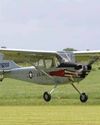
Legend Hobby 13-Foot L-19 Bird Dog/ Cessna O-1
This famous multi-mission single engine observation aircraft served from 1950-1974. From calling out target locations to providing intel/recon information, the Bird Dog was a valued asset in both the Korean War and Vietnam.
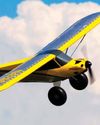
EARN YOUR WINGS
10 Tips for First-Flight Success
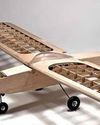
Old School Model Works Fifty Six
The Fifty Six takes its design cues from the original .09- to .15-size Carl Goldberg Falcon 56 of the 1960s. Reworked to incorporate modern, lasercut techniques to make kit building better than ever.
FLYING TWINS Multi-engine warbirds made easy
Let’s face it, there’s just something extra special about twin-engine RC aircraft. Most modelers stop what they’re doing when a twin fires up on the flightline.
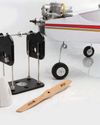
HOW TO BALANCE PROPELLERS
Four easy steps to increase performance and reduce vibration
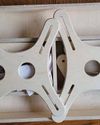
PRODUCT REVIEW: RC PLANE STANDS BENCHTOP MODEL
I’m a sucker for shop stuff. I buy tools I will probably never use just because they are cool, or I might need to use them someday. When Glen from RC Plane Stands reached out about a review, however, I knew as soon as I browsed their website that I would be receiving something I would use a lot, maybe even daily.
SPIRIT OF RHINEBECK AWARD WINNER
A close up of Norman Malinowski’s 1/3-scale Albatros
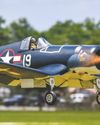
CENTER OF GRAVITY BASICS
The secret to a plane that flies well